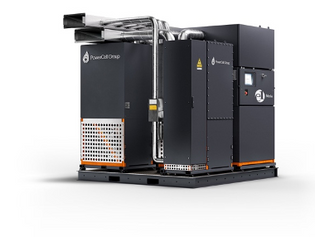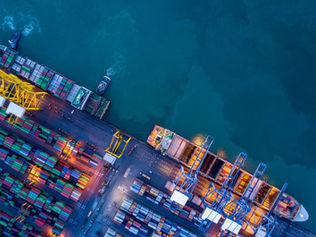The IMO has set mandatory legislation demanding global marine reduce carbon intensity 40% by 2030, and 70% by 2050, with an overall GHG emission reduction of 50% by 2050. Hydrogen fuel cells are widely accepted as the optimal solution to reducing GHG, but this is only viable if the marine industry can overcome the supply, cost, transport, storage, and refueling challenges of providing hydrogen to the fuel cells.
The problem: Reducing
Maritime Carbon Emissions



Hydrogen power for the marine sector: Onsite, onboard and on demand.
e1 Marine provides clean energy technologies, including advanced methanol to hydrogen generation products supporting the fuel cell industry.
Our ground-breaking technology enables maritime and port operators to generate fuel-cell grade hydrogen portside or onboard, efficiently and safely – whenever and wherever it's needed. By connecting our methanol to hydrogen generators with fuel cell power solutions, e1 Marine can help you begin your energy transition.
e1 Marine – the pathway to decarbonization.

e1 Marine Methanol to Hydrogen Generator
Scalable, mobile, and standalone hydrogen generation.
The e1 Marine methanol to hydrogen generator with its patented membrane purifier, produces hydrogen – when and where it is needed. No need for high-volume electrical power. Once running, a standard hydrogen fuel cell running on e1 Marine hydrogen produces its own electrical power – creating a far more efficient operating range for the vessel.

e1 Marine Enabling Regulatory Compliance
Today's maritime applications demand durable, high-performance, and compact systems. e1 Marine is leading the way to dramatically cut the carbon intensity of marine power for passenger vessels, towboats, tugs, shoreside power, and barges.
This is an immediately viable alternative to fossil fuels that can help the maritime industry achieve carbon targets with low to no pollution, supporting global efforts towards international climate change legislation.


M/V Hydrogen One
The world’s first methanol to hydrogen fuel cell towboat.
With construction set to begin in 2026, M/V Hydrogen One is set to join the Maritime Partners fleet, to meet the pressing demand for sustainable towboat operations. The vessel will be IMO 2030 compliant, meet the USCG’s Subchapter M requirements, and have an operational range of 850 miles before refueling.
e1 Marine's hydrogen generator products are easily integrated with advanced marine fuel cell power solutions.
They are adaptable for use in stationary power applications in ports and terminals, including cold ironing, reefers, and backup power, as well as onboard the vessel as primary propulsion and auxiliary power systems.
Applications
Today's maritime applications demand durable, high-performance, and compact systems.

Hydrogen at work - safe storage and safe transport.
Readily available worldwide, methanol offers far greater hydrogen density for safer, cheaper storage than high-pressure fuel-grade hydrogen. There is no need for expensive, dangerous, high-pressure hydrogen transportation and bunkering. Onboard hydrogen can now be generated using methanol mixed with water - sourced from the very water the vessel sails in.
Technology
Methanol as a Marine Fuel - safe storage, safe transport, renewable future
Methanol is an ideal marine transportation fuel. It has a high energy density and is widely available in ports globally. Handling methanol utilizes familiar fuel logistics and safety protocols, and methanol offers safer and less expensive fuel storage than compressed hydrogen. When using methanol as a hydrogen carrier, there is no need for expensive, dangerous, high-pressure hydrogen transportation and bunkering.
Hydrogen can now be generated onboard or portside using a feedstock of methanol and DI water.
Methanol enriched with water has up to six times the energy density of compressed hydrogen, providing fuel cell power solutions with significantly reduced cost, increased safety, efficiency, and operational range.
Methanol has a renewable zero-emission future, just like renewable hydrogen and RNG.

Fuel cells are the most energy-efficient device available for extracting power from fuels. Fuel cells are maximally efficient at 60%, thus 37% more efficient than a diesel engine.
A fuel cell will directly convert the chemical energy in hydrogen to electricity, with pure water and potentially useful heat as the only byproducts. Hydrogen-powered fuel cells are not only pollution-free, but they can be more efficient than traditional combustion technologies.
Marine class fuel cells provide clean zero-emission power with up to a multi-megawatt scale for both prime propulsion and auxiliary power applications. Fuel cells offer marine operators power solutions that meet IMO guidelines – right now.
Fuel Cell Power: Clean Zero-Emission Power – (Solving the IMO problem)

The missing link to fuel cell power adoption.
Hydrogen is a challenging fuel; it is expensive to transport and store. It is also nearly impossible, to achieve an acceptable vessel range from liquified or compressed hydrogen due to onboard storage requirements. These challenges mean that marine and port operators are facing significant economic, technical, logistical, and range hurdles when introducing hydrogen and fuel cell power technology to their fleets.
e1 Marine can solve these challenges.
Our methanol to hydrogen generator products are simple, robust, cost-effective, and produce pure fuel cell grade hydrogen anywhere you need it, in real-time, as required by your fuel cell power solution. No expensive and volume-intensive high-pressure hydrogen storage is required.

















